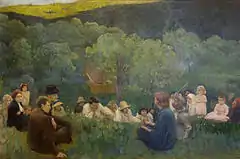Matthew 6:25
Matthew 6:25 is the twenty-fifth verse of the sixth chapter of the Gospel of Matthew in the New Testament and is part of the Sermon on the Mount. This verse shifts the discussion from one of money to one of worry.
| Matthew 6:25 | |
|---|---|
← 6:24 6:26 → | |
 "Sermon on the Mountain" (1896) by Károly Ferenczy (1862–1917). | |
| Book | Gospel of Matthew |
| Christian Bible part | New Testament |
Content
In Koine Greek it reads:
- Διὰ τοῦτο λέγω ὑμῖν, μὴ μεριμνᾶτε τῇ ψυχῇ ὑμῶν τί φάγητε ἢ τί πίητε, μηδὲ τῷ σώματι ὑμῶν τί ἐνδύσησθε· οὐχὶ ἡ ψυχὴ πλεῖόν ἐστιν τῆς τροφῆς καὶ τὸ σῶμα τοῦ ἐνδύματος;
- Dia touto legō hymin, mě merimnate tē psychē hymōn ti phagēte ē ti piēte, mēde tō sōmati hymōn ti endysēsthe. Ouchi hē psychē pleion estin tēs trophēs kai to sōma tou endymatos?
In the King James Version of the Bible the text reads:
- Therefore I say unto you, Take no thought for
- your life, what ye shall eat, or what ye shall drink;
- nor yet for your body, what ye shall put on. Is not
- the life more than meat, and the body than raiment?
The World English Bible translates the passage as:
- Therefore, I tell you, don’t be anxious for your life:
- what you will eat, or what you will drink; nor yet
- for your body, what you will wear. Isn’t life more
- than food, and the body more than clothing?
For a collection of other versions see BibleHub Matthew 6:25
Analysis
Jesus has just told his followers that it is impossible to pursue both God and wealth. In this verse he begins a discussion of why one should not be over anxious about all material things. The word “more than” in this context means that the second object being compared exists even without the first. Thus “life (or the soul — see below) continues even without sustenance” including after death according to both Greek and Jewish beliefs in an eternal soul, and “the body continues even without clothes,” that is you can live even naked. With the second phrase explaining the first, this is the lesson: it is against reason to worry about non-essential things (sustenance and clothes) and neglect the essential (the body and its health, and the soul and its obedience to God).
Fowler notes that the early manuscripts are divided on whether the verse includes the question "what will you drink." The absence of this question would make a clearer parallel with later verses, as while the questions about food and clothing are answered, this one is not.[1]
The word translated as life could also refer to the soul, but writers of the period did not see a distinction between the two concepts.[2] So when Jesus states that one should not be anxious about one's soul, it is likely that this is meant in the Jewish sense of vitality or vigor, rather than the Christian theological idea of the soul. Thus the soul, which in this verse is portrayed as both eating or drinking, is more accurately translated as life. The word translated in this verse as eat is the same word frequently translated as rust in Matthew 6:19.[3]
References
- Fowler, Harold. The Gospel of Matthew: Volume One. Joplin: College Press, 1968
- Nolland, John. The Gospel of Matthew: a commentary on the Greek text. Wm. B. Eerdmans Publishing, 2005 pg. 198
- Hendriksen, William. The Gospel of Matthew. Edinburgh: Banner of Truth Trust, 1976
| Preceded by Matthew 6:24 |
Gospel of Matthew Chapter 6 |
Succeeded by Matthew 6:26 |